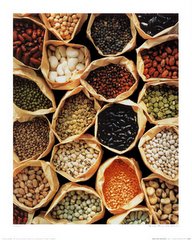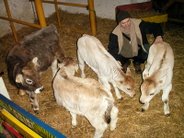Tuesday, August 21, 2007
Is local the new organic?
Article found in Gristmill
Last week, The New York Times ran a feature by Marian Burros on New Seasons Markets, a grocery store chain in Portland that's banking on consumer interest in local, sustainable food -- as opposed to simply organic.
The chain recently completed an inventory of the origins of its stock and has labeled everything grown in Oregon, Washington, and Northern California "Homegrown." They've already got six stores and three more on the way, but remain adamantly opposed to expanding beyond the Portland suburbs -- a testament to their commitment to being grounded in the local food economy.
People concerned about health, taste, and the environment have long sought out organic products. Once a cutting-edge concept for gourmets and health-food junkies, organic is now mainstream, with many familiar major food brands launching organic product lines. I bought organic milk at a Seattle Safeway the other day that was packaged under Safeway's own new "O" label. Organics are the fastest growing segment of the food industry, with sales increasing by some 20 percent per year.
But, as the NYT piece notes, organic alone is not the answer to the question of the fundamental role food plays in our local economy, environment, food security, community vitality, or even health and enjoyment. I don't know where that organic milk I bought from Safeway came from. I like the idea of sticking with my delivery from Smith Brothers dairy each week. Even though it's not organic, there's no growth hormone used and I am supporting the last of the independent dairy farms in my state, Washington.
We won't be seeing New Seasons outside the Portland area any time soon -- but other areas are making progress on the local food front.
In the Seattle area, for example, cutting-edge projects are exploring food as a driver in the local economy and as a focal point for public policies ranging from health and nutrition to urban planning and even transportation.
Sustainable Seattle is launching a first-of-its-kind research project looking at how dollars spent on locally produced food affect the local economy, as a counterpoint to the dollar spent on the average grocery item that has traveled 1500 miles to reach the consumer.
Washington State University's King County Extension office is leading an effort to establish a food policy council for Seattle and King County that would bring together a broad spectrum of food system participants -- from farmers to hunger activists to grocery executives to land use experts -- to work jointly on solutions to current challenges like childhood obesity, disappearing farmland, and alarmingly high levels of hunger in our community.
I have always believed in the power of coming to the table together to hash out issues, find common ground, and be reminded of one another's humanity, but I have most often thought about it in the very personal context of family and friends. In these times of bitter division, can coming to the table in celebration of delicious local-grown bounty help remind us of our many shared values and experiences?
Last week, The New York Times ran a feature by Marian Burros on New Seasons Markets, a grocery store chain in Portland that's banking on consumer interest in local, sustainable food -- as opposed to simply organic.
The chain recently completed an inventory of the origins of its stock and has labeled everything grown in Oregon, Washington, and Northern California "Homegrown." They've already got six stores and three more on the way, but remain adamantly opposed to expanding beyond the Portland suburbs -- a testament to their commitment to being grounded in the local food economy.
People concerned about health, taste, and the environment have long sought out organic products. Once a cutting-edge concept for gourmets and health-food junkies, organic is now mainstream, with many familiar major food brands launching organic product lines. I bought organic milk at a Seattle Safeway the other day that was packaged under Safeway's own new "O" label. Organics are the fastest growing segment of the food industry, with sales increasing by some 20 percent per year.
But, as the NYT piece notes, organic alone is not the answer to the question of the fundamental role food plays in our local economy, environment, food security, community vitality, or even health and enjoyment. I don't know where that organic milk I bought from Safeway came from. I like the idea of sticking with my delivery from Smith Brothers dairy each week. Even though it's not organic, there's no growth hormone used and I am supporting the last of the independent dairy farms in my state, Washington.
We won't be seeing New Seasons outside the Portland area any time soon -- but other areas are making progress on the local food front.
In the Seattle area, for example, cutting-edge projects are exploring food as a driver in the local economy and as a focal point for public policies ranging from health and nutrition to urban planning and even transportation.
Sustainable Seattle is launching a first-of-its-kind research project looking at how dollars spent on locally produced food affect the local economy, as a counterpoint to the dollar spent on the average grocery item that has traveled 1500 miles to reach the consumer.
Washington State University's King County Extension office is leading an effort to establish a food policy council for Seattle and King County that would bring together a broad spectrum of food system participants -- from farmers to hunger activists to grocery executives to land use experts -- to work jointly on solutions to current challenges like childhood obesity, disappearing farmland, and alarmingly high levels of hunger in our community.
I have always believed in the power of coming to the table together to hash out issues, find common ground, and be reminded of one another's humanity, but I have most often thought about it in the very personal context of family and friends. In these times of bitter division, can coming to the table in celebration of delicious local-grown bounty help remind us of our many shared values and experiences?
Subscribe to:
Post Comments (Atom)



















No comments:
Post a Comment